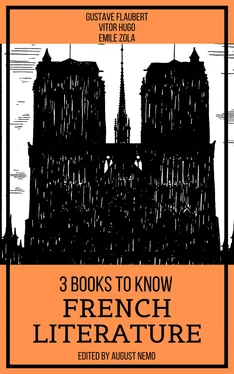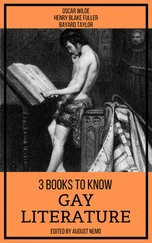The Bishop clapped his hands.
“That’s talking!” he exclaimed. “What an excellent and really marvellous thing is this materialism! Not every one who wants it can have it. Ah! when one does have it, one is no longer a dupe, one does not stupidly allow one’s self to be exiled like Cato, nor stoned like Stephen, nor burned alive like Jeanne d’Arc. Those who have succeeded in procuring this admirable materialism have the joy of feeling themselves irresponsible, and of thinking that they can devour everything without uneasiness,—places, sinecures, dignities, power, whether well or ill acquired, lucrative recantations, useful treacheries, savory capitulations of conscience,—and that they shall enter the tomb with their digestion accomplished. How agreeable that is! I do not say that with reference to you, senator. Nevertheless, it is impossible for me to refrain from congratulating you. You great lords have, so you say, a philosophy of your own, and for yourselves, which is exquisite, refined, accessible to the rich alone, good for all sauces, and which seasons the voluptuousness of life admirably. This philosophy has been extracted from the depths, and unearthed by special seekers. But you are good-natured princes, and you do not think it a bad thing that belief in the good God should constitute the philosophy of the people, very much as the goose stuffed with chestnuts is the truffled turkey of the poor.”
Chapter IX
The Brother As Depicted By The Sister
––––––––
In order to furnish an idea of the private establishment of the Bishop of D——, and of the manner in which those two sainted women subordinated their actions, their thoughts, their feminine instincts even, which are easily alarmed, to the habits and purposes of the Bishop, without his even taking the trouble of speaking in order to explain them, we cannot do better than transcribe in this place a letter from Mademoiselle Baptistine to Madame the Vicomtess de Boischevron, the friend of her childhood. This letter is in our possession.
D——, Dec. 16, 18—.
MY GOOD MADAM: Not a day passes without our speaking of you. It is our
established custom; but there is another reason besides. Just imagine,
while washing and dusting the ceilings and walls, Madam Magloire has
made some discoveries; now our two chambers hung with antique paper
whitewashed over, would not discredit a château in the style of yours.
Madam Magloire has pulled off all the paper. There were things beneath.
My drawing-room, which contains no furniture, and which we use for
spreading out the linen after washing, is fifteen feet in height,
eighteen square, with a ceiling which was formerly painted and gilded,
and with beams, as in yours. This was covered with a cloth while this
was the hospital. And the woodwork was of the era of our grandmothers.
But my room is the one you ought to see. Madam Magloire has discovered,
under at least ten thicknesses of paper pasted on top, some paintings,
which without being good are very tolerable. The subject is Telemachus
being knighted by Minerva in some gardens, the name of which escapes
me. In short, where the Roman ladies repaired on one single night. What
shall I say to you? I have Romans, and Roman ladies [here occurs an
illegible word], and the whole train. Madam Magloire has cleaned it all
off; this summer she is going to have some small injuries repaired, and
the whole revarnished, and my chamber will be a regular museum. She has
also found in a corner of the attic two wooden pier-tables of ancient
fashion. They asked us two crowns of six francs each to regild them, but
it is much better to give the money to the poor; and they are very ugly
besides, and I should much prefer a round table of mahogany.
I am always very happy. My brother is so good. He gives all he has to
the poor and sick. We are very much cramped. The country is trying in
the winter, and we really must do something for those who are in need.
We are almost comfortably lighted and warmed. You see that these are
great treats.
My brother has ways of his own. When he talks, he says that a bishop
ought to be so. Just imagine! the door of our house is never fastened.
Whoever chooses to enter finds himself at once in my brother’s room. He
fears nothing, even at night. That is his sort of bravery, he says.
He does not wish me or Madame Magloire feel any fear for him. He exposes
himself to all sorts of dangers, and he does not like to have us even
seem to notice it. One must know how to understand him.
He goes out in the rain, he walks in the water, he travels in winter. He
fears neither suspicious roads nor dangerous encounters, nor night.
Last year he went quite alone into a country of robbers. He would
not take us. He was absent for a fortnight. On his return nothing had
happened to him; he was thought to be dead, but was perfectly well, and
said, “This is the way I have been robbed!” And then he opened a trunk
full of jewels, all the jewels of the cathedral of Embrun, which the
thieves had given him.
When he returned on that occasion, I could not refrain from scolding him
a little, taking care, however, not to speak except when the carriage
was making a noise, so that no one might hear me.
At first I used to say to myself, “There are no dangers which will stop
him; he is terrible.” Now I have ended by getting used to it. I make a
sign to Madam Magloire that she is not to oppose him. He risks himself
as he sees fit. I carry off Madam Magloire, I enter my chamber, I pray
for him and fall asleep. I am at ease, because I know that if anything
were to happen to him, it would be the end of me. I should go to the
good God with my brother and my bishop. It has cost Madam Magloire
more trouble than it did me to accustom herself to what she terms his
imprudences. But now the habit has been acquired. We pray together, we
tremble together, and we fall asleep. If the devil were to enter this
house, he would be allowed to do so. After all, what is there for us
to fear in this house? There is always some one with us who is stronger
than we. The devil may pass through it, but the good God dwells here.
This suffices me. My brother has no longer any need of saying a word to
me. I understand him without his speaking, and we abandon ourselves to
the care of Providence. That is the way one has to do with a man who
possesses grandeur of soul.
I have interrogated my brother with regard to the information which you
desire on the subject of the Faux family. You are aware that he knows
everything, and that he has memories, because he is still a very
good royalist. They really are a very ancient Norman family of the
generalship of Caen. Five hundred years ago there was a Raoul de Faux, a
Jean de Faux, and a Thomas de Faux, who were gentlemen, and one of whom
was a seigneur de Rochefort. The last was Guy-Étienne-Alexandre, and was
commander of a regiment, and something in the light horse of Bretagne.
His daughter, Marie-Louise, married Adrien-Charles de Gramont, son of
the Duke Louis de Gramont, peer of France, colonel of the French guards,
and lieutenant-general of the army. It is written Faux, Fauq, and
Faoucq.
Good Madame, recommend us to the prayers of your sainted relative,
Monsieur the Cardinal. As for your dear Sylvanie, she has done well in
not wasting the few moments which she passes with you in writing to me.
She is well, works as you would wish, and loves me.
That is all that I desire. The souvenir which she sent through you
Читать дальше












